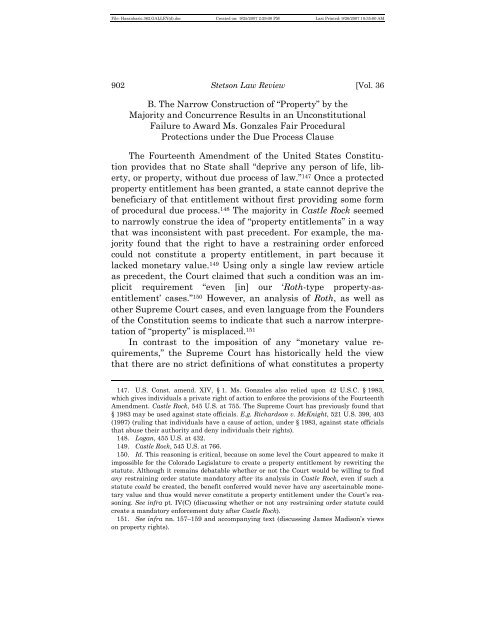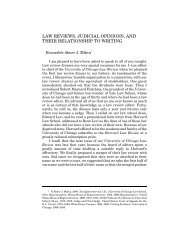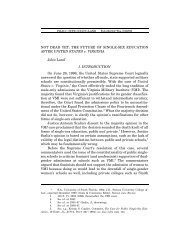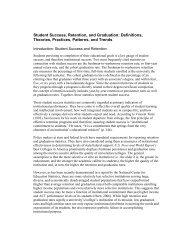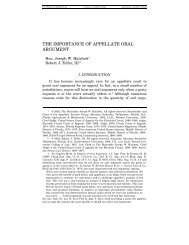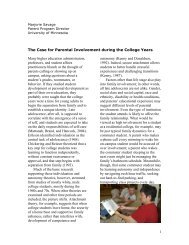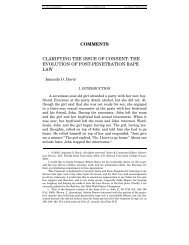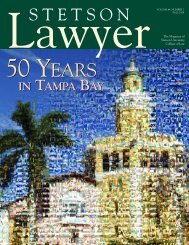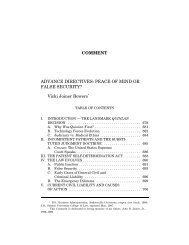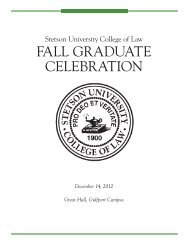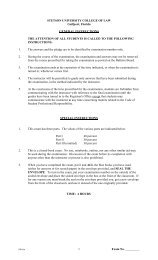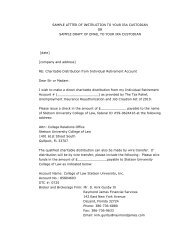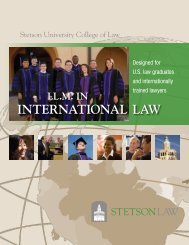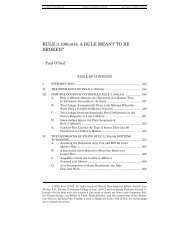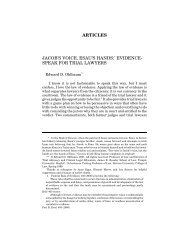TOWN OF CASTLE ROCK v. GONZALES: THE ... - Stetson University
TOWN OF CASTLE ROCK v. GONZALES: THE ... - Stetson University
TOWN OF CASTLE ROCK v. GONZALES: THE ... - Stetson University
Create successful ePaper yourself
Turn your PDF publications into a flip-book with our unique Google optimized e-Paper software.
File: Hasanbasic.362.GALLEY(d).doc Created on: 9/25/2007 2:29:00 PM Last Printed: 9/26/2007 10:35:00 AM902 <strong>Stetson</strong> Law Review [Vol. 36B. The Narrow Construction of “Property” by theMajority and Concurrence Results in an UnconstitutionalFailure to Award Ms. Gonzales Fair ProceduralProtections under the Due Process ClauseThe Fourteenth Amendment of the United States Constitutionprovides that no State shall “deprive any person of life, liberty,or property, without due process of law.” 147 Once a protectedproperty entitlement has been granted, a state cannot deprive thebeneficiary of that entitlement without first providing some formof procedural due process. 148 The majority in Castle Rock seemedto narrowly construe the idea of “property entitlements” in a waythat was inconsistent with past precedent. For example, the majorityfound that the right to have a restraining order enforcedcould not constitute a property entitlement, in part because itlacked monetary value. 149 Using only a single law review articleas precedent, the Court claimed that such a condition was an implicitrequirement “even [in] our ‘Roth-type property-asentitlement’cases.” 150 However, an analysis of Roth, as well asother Supreme Court cases, and even language from the Foundersof the Constitution seems to indicate that such a narrow interpretationof “property” is misplaced. 151In contrast to the imposition of any “monetary value requirements,”the Supreme Court has historically held the viewthat there are no strict definitions of what constitutes a property147. U.S. Const. amend. XIV, § 1. Ms. Gonzales also relied upon 42 U.S.C. § 1983,which gives individuals a private right of action to enforce the provisions of the FourteenthAmendment. Castle Rock, 545 U.S. at 755. The Supreme Court has previously found that§ 1983 may be used against state officials. E.g. Richardson v. McKnight, 521 U.S. 399, 403(1997) (ruling that individuals have a cause of action, under § 1983, against state officialsthat abuse their authority and deny individuals their rights).148. Logan, 455 U.S. at 432.149. Castle Rock, 545 U.S. at 766.150. Id. This reasoning is critical, because on some level the Court appeared to make itimpossible for the Colorado Legislature to create a property entitlement by rewriting thestatute. Although it remains debatable whether or not the Court would be willing to findany restraining order statute mandatory after its analysis in Castle Rock, even if such astatute could be created, the benefit conferred would never have any ascertainable monetaryvalue and thus would never constitute a property entitlement under the Court’s reasoning.See infra pt. IV(C) (discussing whether or not any restraining order statute couldcreate a mandatory enforcement duty after Castle Rock).151. See infra nn. 157–159 and accompanying text (discussing James Madison’s viewson property rights).


